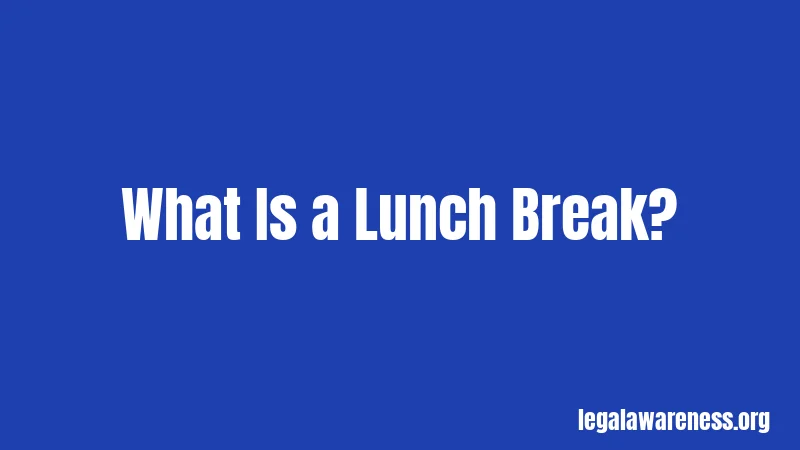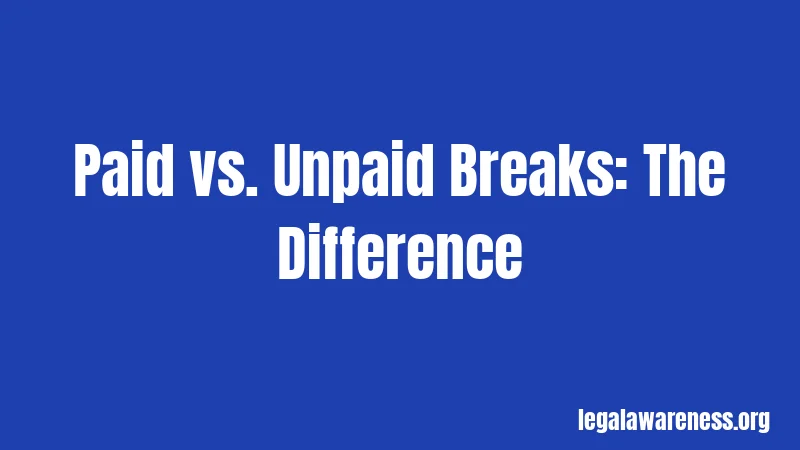Missouri Lunch Break Laws (2026): Your Rights and Employer Obligations
Most employees assume lunch breaks are guaranteed. Spoiler alert: they’re not. In Missouri, the rules around breaks are actually way more flexible than you might think. The good news? We’ll walk you through exactly what your employer can and can’t do.
Here’s the reality: Missouri doesn’t have many state-specific lunch break requirements. That means federal law and your employment contract basically call the shots. Let’s break down what that actually means for you.
What Is a Lunch Break?

A lunch break is time off during your work shift when you’re not supposed to work. You get to eat, rest, or do whatever you want during this time. Right? Well, not exactly. It depends on how your employer structures it.
Here’s what matters: if your employer tells you to take a break, you need to understand the rules. They might give you a paid break or an unpaid break. The type matters more than you’d think.
Basic Missouri Lunch Break Laws
No State Requirement for Lunch Breaks
Okay, here’s the big one. Missouri has no state law requiring employers to give you a lunch break. Seriously. Your employer isn’t legally forced to give you a break at all, even during an eight-hour shift.
That sounds harsh, right? But wait, there’s more to consider. Federal law steps in for certain situations. And your employee handbook might promise breaks too. Don’t assume nothing applies just because Missouri stays quiet.
Federal Law Takes Over
When Missouri doesn’t have its own rule, federal labor law kicks in. The Fair Labor Standards Act (FLSA) is the big player here. It sets rules for breaks, but honestly, they’re pretty employer-friendly.
Here’s what FLSA says: short breaks (usually five to twenty minutes) must be paid. But meal breaks over twenty minutes? Your employer can make those unpaid. Even if you’re sitting at your desk eating lunch.
What Counts as “Paid” vs “Unpaid”
This one confuses a lot of people. Here’s the real deal.
A paid break means you’re clocked in. Your employer pays you for that time. Even if you’re not actually working, the clock counts it as hours worked. Federal law requires short breaks (under 20 minutes) to be paid.
An unpaid break is when you clock out. Your employer doesn’t pay you. You’re off the clock. Federal law allows unpaid breaks for meal periods that last at least thirty minutes (though some employers set them shorter). The catch? You have to be fully relieved of your duties.
Not sure what your break status is? Check your pay stub. Look at your clocking system. Ask your manager directly. Most companies track this stuff carefully because they have to.
Eighteen Minus Restrictions
Wait, here’s something important. Missouri has specific rules for workers under eighteen. If you’re a minor employee, different rules apply. Federal labor law requires rest periods for younger workers.
Minors (under 18) get more protection than adults. In many cases, they’re entitled to breaks that adults aren’t guaranteed. Your state might have additional youth employment rules too. If you manage teen workers, this matters. If you’re a teen, this helps you.
Paid vs. Unpaid Breaks: The Difference

Short Breaks (5-20 Minutes)
These must be paid under federal law. Your employer can’t deduct this time from your paycheck. If your boss gives you a fifteen-minute break to grab coffee, you’re getting paid for those fifteen minutes. Period.
Some employers try to blur the lines. They might say “just check email during your break” or “think about work stuff.” That doesn’t fly. If you’re on a short break, you shouldn’t be working. And you should be paid.
Meal Breaks (30+ Minutes)
This is where things get tricky. Meal breaks that last at least thirty minutes can be unpaid. Your employer can clock you out. You’re not getting paid, but you don’t have to work either.
Here’s the key phrase: “completely relieved of duties.” You need to be able to leave your desk. You can’t be on-call. You can’t have to answer emails or pick up the phone. You’re genuinely off the clock.
What if your employer breaks this rule? What if they say “don’t work during your unpaid lunch” but then make you answer emails? That time might need to be paid. Document it if this happens to you.
Special Rules for Different Industries
Retail and Service Workers
Retail workers and food service staff have a unique situation. Your break rights don’t change legally, but practically, things can look different. Scheduling might be tighter. Coverage needs might be higher.
Your employer still can’t make you skip breaks or work during unpaid time. But they might structure schedules differently. Stay aware of your actual break time. Don’t let scheduling pressure prevent you from taking what you’re entitled to.
Healthcare Workers
Healthcare facilities operate differently. Employees in hospitals, nursing homes, and clinics often work longer shifts. The break rules don’t change, but the practice can look different.
Honestly, this is one area where many healthcare workers get shortchanged. Busy floors mean skipped breaks. Understaffing means unpaid work during “breaks.” If this happens to you regularly, it’s worth documenting and reporting.
Remote Workers
Working from home changed the break conversation. Your employer still can’t require you to work during lunch. But the lines blur more easily when your bed and your desk are in the same room.
Set clear boundaries. Actually take your breaks. Don’t work through lunch just because you’re home. Your employer can’t legally require you to, and frankly, you need the mental break anyway.
What If You’re Salaried?

Here’s where salary status gets confusing. Many people think “salary” means “no breaks required.” That’s wrong. Your salary status doesn’t actually eliminate break rights.
Salaried employees still need breaks. You’re still entitled to rest periods. Your employment contract might specify when and how, but Missouri law and federal law still apply.
The main difference? Salary is paid as a lump sum. Your salary covers your base hours and generally can’t be reduced for short absences or breaks. But that’s different from saying breaks don’t apply.
Penalties If Your Employer Violates These Laws
Unpaid Wages
This is the big one. If your employer made you work during unpaid time, they owe you wages. They might argue you didn’t ask for pay. Doesn’t matter. Federal law says if you worked, you get paid.
You can file a wage claim. Missouri allows these for unpaid wages. You might recover back pay plus damages. It’s worth pursuing if it’s happened repeatedly.
Department of Labor Complaints
The U.S. Department of Labor investigates break violations. You can file a complaint with the Wage and Hour Division. They’ll investigate whether your employer broke federal law.
This process takes time. But it’s free. And employers take these complaints seriously because investigations can result in fines and required back pay.
Civil Lawsuits
You can sue your employer for wage violations. An employment attorney can help you pursue this. You might recover unpaid wages, attorney fees, and damages.
Think of it like this: your labor has value. If your employer took it without paying, that’s stealing. The law recognizes this. It gives you ways to fight back.
Special Circumstances and Exceptions
Shift Length Matters
Generally, the longer your shift, the more breaks you might expect. An eight-hour shift usually includes one or two breaks. A twelve-hour shift typically includes more.
That said, Missouri doesn’t set a magic number. There’s no law saying “eight hours equals two breaks.” It’s based on federal guidance and industry practice. Check your employee handbook or ask your manager what your specific break schedule should be.
Union Contracts
If you’re in a union, your contract probably specifies break rules. Union contracts often provide more generous break policies than the law requires. Read your contract. Know what you’re entitled to.
Union protections are powerful here. If your employer violates your contract, the union can fight for you. Don’t ignore your contract’s language around breaks.
Nursing and Pumping Breaks
If you’re nursing or expressing breast milk, federal law requires your employer to give you reasonable break time. This is separate from regular breaks. You’re entitled to this even if Missouri doesn’t require other breaks.
Your employer must provide private space (not a bathroom) for nursing or pumping. Reasonable break time means enough time to do it, not just five minutes. Don’t let anyone pressure you to skip these breaks.
How to Protect Your Break Rights
Know Your Rights
Read your employee handbook. Ask your manager about your official break schedule. Write down when you actually take breaks and how long they are.
This documentation matters. If you need to file a complaint later, you’ll have records. Dates, times, and details matter way more than you’d think.
Document Everything
Keep a simple log. Note when you work during unpaid breaks. Write down if your employer makes you stay clocked in during lunch. Save emails showing work requests during break time.
You don’t need anything fancy. A calendar with notes works fine. Your goal is proof. If disputes come up later, this helps.
Speak Up Professionally
Talk to your manager or HR about concerns. Sometimes it’s a misunderstanding. Sometimes the company doesn’t realize they’re violating the law.
Keep it professional. Don’t accuse anyone. Just explain what’s happening. Say something like, “I want to make sure I’m following the break policy correctly. Can we clarify how my breaks are handled?”
File Complaints If Needed
If talking doesn’t work, escalate. The U.S. Department of Labor Wage and Hour Division has a phone number and website. You can file online or call.
Missouri also has employment agencies that handle complaints. The state might have additional protections or resources. Check the Missouri Department of Labor’s website for state-specific guidance.
Frequently Asked Questions
Does my employer have to give me a lunch break in Missouri? No state law requires it. But federal law requires unpaid meal breaks in certain situations, and short breaks must be paid. Check your employment contract and handbook.
Can my employer make me work during my lunch break? If you’re unpaid, you shouldn’t be working at all. If you do work during unpaid time, you should get paid. If you’re on a paid break, technically they can require work, but it’s unusual and worth questioning.
What if I skip my lunch break to leave early? That depends on your agreement with your employer. Some companies allow it; others don’t. Ask first. Your employer can require you to take breaks, even if you’d rather work straight through.
How do I report my employer if they’re not giving breaks? Contact the U.S. Department of Labor Wage and Hour Division. You can file a complaint online at www.dol.gov or call your local office. Missouri might have state resources too.
Are salaried employees entitled to breaks? Yes. Salary status doesn’t remove break rights. Salaried workers are still entitled to rest periods and meal breaks under federal law.
What happens if I work during my unpaid lunch break? You should get paid for that time. It’s considered hours worked under federal law. Document it and notify your employer or HR.
Do I need a lawyer to file a complaint? No. You can file complaints for free with the government. But an employment attorney can help if you want to pursue a lawsuit for damages.
Final Thoughts
Here’s the bottom line: Missouri doesn’t give you as much legal protection as some states. But federal law fills in the gaps. You have rights around breaks, even if Missouri stays quiet about them.
Don’t assume your employer can do whatever they want. Document your breaks. Know the difference between paid and unpaid time. If something feels wrong, it probably is.
When in doubt, ask HR, call the Department of Labor, or chat with an employment lawyer. These resources exist because break violations happen. You deserve to understand your rights and take actual breaks.
Stay informed. Protect your time. Your wellbeing depends on it.
